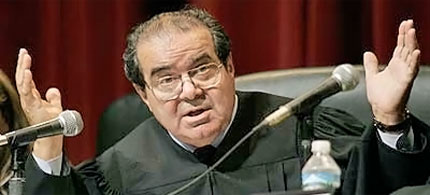Posted on February
14, 2016
What Would Scalia Say?
No reason Obama shouldn’t appoint
by
Daniel
Clark
“Elections have consequences.” President Obama once said that, and yet it’s
true. One might have hoped we’d all have
learned it by now.
The consensus among the candidates at the South
Carolina Republican Primary Debate was that Obama is somehow obligated to
abstain from appointing a successor to the late Supreme Court Justice Antonin
Scalia. Their basis for this argument is
that it’s a tradition that a president does not make a Supreme Court appointment
during an election year, especially when that appointment would dramatically
change the Court’s ideological makeup.
 Well,
actually, it’s not something that’s not traditionally done so much as it is something
that simply doesn’t come up very often.
Whatever the case, the claim has no constitutional basis. Article II Section 2 says that the president
“shall appoint” Supreme Court justices “by and with the Advice and Consent of
the Senate.” This empowers the Senate to
reject a particular appointee if it wishes, but it does not allow that body to
preemptively deny the president the ability to make an appointment. The idea that the phrase “shall appoint”
could be interpreted as “may appoint, unless otherwise bound by some nebulous
political tradition” is the kind of anti-constitutional reasoning that the
famously caustic Scalia would regularly lampoon in his dissents.
Well,
actually, it’s not something that’s not traditionally done so much as it is something
that simply doesn’t come up very often.
Whatever the case, the claim has no constitutional basis. Article II Section 2 says that the president
“shall appoint” Supreme Court justices “by and with the Advice and Consent of
the Senate.” This empowers the Senate to
reject a particular appointee if it wishes, but it does not allow that body to
preemptively deny the president the ability to make an appointment. The idea that the phrase “shall appoint”
could be interpreted as “may appoint, unless otherwise bound by some nebulous
political tradition” is the kind of anti-constitutional reasoning that the
famously caustic Scalia would regularly lampoon in his dissents.
The Republicans are sounding less like Scalia than
they are like Obama, who often invokes imaginary, unwritten contracts to which
he subordinates the Constitution.
Surely, most of them know better.
The time to take a stand is not before the president has exercised his constitutional
duty to appoint a justice to the Supreme Court, but when the time comes for an
up-or-down Senate confirmation vote on a specific appointee. If that appointee disdains the written law,
as liberals tend to do, then the nomination must be defeated.
What conservative senators like Ted Cruz and Marco
Rubio understand, however, is that their colleagues lack the will to wage that
battle. They know that any nominee Obama
sends them is going to be an affront to the Constitution, but that a certain
number of invertebrate GOP Jellyphants will vote for
confirmation anyway. In 2009, the Senate
was presented with a video of nominee Sonia Sotomayor openly declaring that it
is the role of the judiciary to create law.
Nevertheless, she now sits on the Supreme Court, where she may poison American
jurisprudence for decades to come, with the blessing of nine Republican
senators.
 The
Jellyphants are constantly aquiver at the prospect of
provoking a government shutdown, an event that has never been known to have any
electoral consequences. They consider
Cruz to be a dangerous zealot, just because he promotes legislation that Obama
would be inclined to veto. How much
wobblier will they become when faced with an election-year Supreme Court
nomination fight?
The
Jellyphants are constantly aquiver at the prospect of
provoking a government shutdown, an event that has never been known to have any
electoral consequences. They consider
Cruz to be a dangerous zealot, just because he promotes legislation that Obama
would be inclined to veto. How much
wobblier will they become when faced with an election-year Supreme Court
nomination fight?
Not only have they shirked their responsibility to
stop Obama’s two previous Supreme Court appointees from being confirmed, but
they’ve gone along with, and even praised, his appointments of dangerous
left-wing authoritarians like former attorney general Eric Holder, former education
secretary Arne Duncan, and “science czar” John Holdren. If they were unwilling to resist Obama in lower-profile
cases like those, they’re not about to invite media criticism by opposing him
while the whole nation is watching.
It’s totally understandable that conservatives would
want to avoid that scenario, but their assertion that Obama is bound by
tradition to thwart his own nomination is constitutionally unsupportable. Furthermore, it lacks any mechanism to compel
the president’s cooperation. All he has
to do is to say no, and appoint a nominee anyway, and he’ll have made the whole
field of Republican presidential candidates look like a gaggle of irrelevant
pipsqueaks. What masochists they must
be, to have voluntarily given him the power to do that to them.
That the candidates would present this peculiar demand
as if it were a defense of Scalia’s principles is sadly ironic. Scalia was the champion of the judicial
philosophy known as originalism, by which the law should be interpreted
according to the original intent of its authors. There is absolutely no evidence that it was
our founders’ intent that the president abrogate his responsibility to appoint
a justice to the Supreme Court, just because a vacancy has arisen under politically
volatile circumstances.
If the Republicans really want to pay their respects
to Justice Scalia, they will kindly stop doing the very thing that he had
fought against his entire life, which is simply making something up that they
wish to be in the law, but isn’t.
The Shinbone: The
Frontier of the Free Press